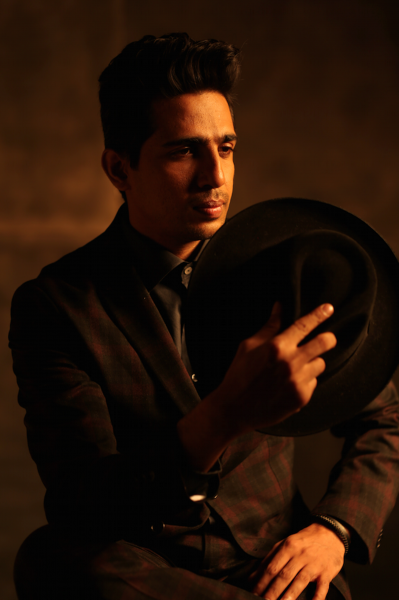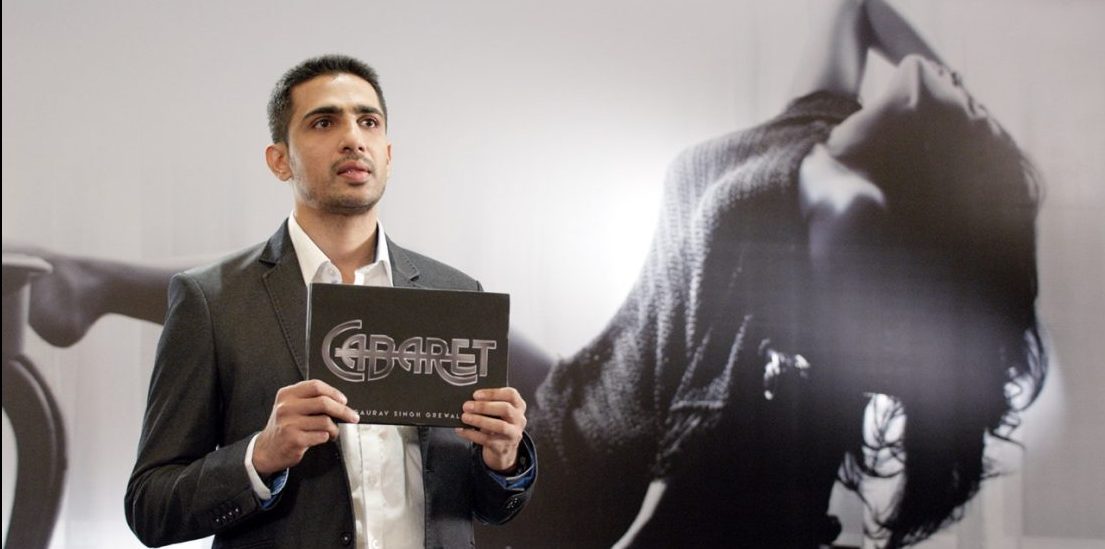I don’t like to limit myself as an actor – Gulshan Devaiah
Gulshan Devaiah made a stellar entry into the industry as an indie star who went on to make his presence felt in mainstream cinema as well. The designer turned actor aspires for a career graph that reflects versatility. His choice of films and roles surely reflects his diverse sensibility while his line up for this year promises growth. As Kaustav Narayan Niyogi’s film Cabaret is set to release this June, we got the opportunity to catch up with the dynamic actor where he delves into his journey, role in Cabaret, future plans and more.

Gulshan Devaiah in Cabaret
Starting out with supporting roles in films like Shaitan and That Girl in Yellow Boots to playing the lead in films like Hate Story and Cabaret, what has your journey been like?
My journey has been amazing. It was my childhood dream to act in Hindi films and I am living my dream right now. I have never really looked at my career and said, “I shouldn’t have done this”. I am one of the fortunate people in this world who are getting to do what they really love. When I look back to where I started, I didn’t even know how to start, I just knew that I wanted to act so I showed up in the city. I knew four people and they guided me; I was fortunate that I got great parts and met really great people who taught me. It has been an amazing journey and I believe that there is no destination; it’s just the journey and I will go as far as I can.
READ: GULSHAN DEVAIAH: A GOOD CHARACTER IS A GOOD ILLUSION
You’ve also managed to maintain a balance between indie and mainstream films, so to say. Has that been a conscious effort?
My choices are directed by my personality, I make very instinctive choices and so you can say that it has been a conscious effort. I am a cinema lover and watch all kinds of films. Ever since I was a child, I would sit and watch films even in languages that I didn’t understand. I love acting in movies, particularly in Hindi movies, so the kind of film doesn’t matter. I have been doing theatre since I was a young boy and I have done all kinds of plays – comedies, tragedies, dramas. So I don’t really like to limit myself as an actor. I don’t choose a film only because I think I would be good at it; I like to explore my potential as an actor by exploring a great deal of variety.
I love acting in movies, particularly in Hindi movies, so the kind of film doesn’t matter
Coming to your upcoming release, tell us a little about the premise of Cabaret and your character in it?
Cabaret in essence is a romantic thriller; a love story between two damaged people. One being Richa Chadda, who is the protagonist as the whole film plays out from her point of view, while I play an alcoholic journalist who is a has-been. He was very promising and very good at his work but lost his way due to incidents that occurred in his life and so he has resorted to drinking himself to death. During this course he meets Richa’s character Rosa, quite unexpectedly, and they fall in love, and then trouble ensues.
READ: I JUST LET THE CHARACTER BREATHE INSIDE ME – RICHA CHADHA
How did you prepare for the role of a journalist? Were there any references given to you?
It wasn’t easy to begin with; when I read the script I was very excited but at the same time I knew it was hard, I don’t know the first thing about journalism, or alcoholism or depression. I have had disappointments in my life, and so one starts making notes to see what you can use from your experiences. As an actor I rely a great deal on imagination. Having worked in theatre has helped me develop this ability of having an active imagination. I did spend a lot of time with the director Kaustav Narayan Niyogi because he wrote my part, and it’s autobiographical, it’s inspired by his younger days when he was in advertising and has battled alcoholism. I spent a lot of time with him, talking to him, and he would share his very personal experiences with me, which helped me get a perspective of what my character Gaurav would be like. Once you have figured out the core, the essence of the character, it becomes easy. The foundation is clear and then you build on that, the costumes, the interaction with the other actors, the script, it all adds onto the character. I don’t believe that if I’m playing a drunkard I have to show up drunk on set, because there is no acting in that, there is no talent, no craft.
No references were given to me by the director, but I did watch a few movies to draw inspiration from. There is a scene in which I am at the bar alone and it gives you some visual cues, I don’t mimic it but I make it my own and use it in my own way.
I don’t believe that if I’m playing a drunkard I have to show up drunk on set
How has it been working with director Kaustav Narayan Niyogi and how would you describe him as a director?
He is very different from all the other directors that I have worked with. He comes from an advertising background, he used to be a creative director and has done very well for himself. He is a very educated, well-read, learned and philosophical man. And he’s a brilliant speaker. I loved listening to the stories that he’d share and this way a bond developed between us. Of course since this was his first movie there was an inexperience and nervousness attached, but having people like Pooja Bhatt and Mahesh Bhatt around to help you is reassuring. He also said that having two wonderful actors also makes it easy, but I think he is just being sweet (smiles). But we did help each other. He has also shared some ideas for his next film with me and I think that he’s a brilliant storyteller who is dying to come out. And after Cabaret we will hopefully get to see that.
You’ve worked with versatile directors from Anurag Kashyap to Sanjay Leel Bhansali. What have been the learnings through each of these associations?
The experience of working with each of these directors is very different; the way each of them work with their actors is very different. I have had very open communication and a great rapport with each of them. We understand each other really well, something that’s very important for me as an actor as I need to understand the director’s vision. Nobody trusts their actors more than Anurag (Kashyap). Nobody is more passionate about making films as Mr. Bhansali. Nobody has a better understanding of the middle class milieu than Harshavardhan (Kulkarni).

Gulshan Devaiah
Richa Chadda too is equally active on the indie and commercial front. How did you connect with her?
That was in fact the common ground. As we both belong to the indie space, we knew each other from before and have also worked with each other in Goliyon ki Raasleela – Ram Leela. We both have that variety in our sensibility and we see ourselves in different kinds of films. She is a fabulous actor and when you have a good co-actor who articulates lines and who finds hidden meanings in the way they behave with you, the interaction becomes very easy. I think her experience of working with various indie directors paired with her sensibilities and my sensibilities, sort of came together very quickly and easily despite different approaches.
When you have a good co-actor who articulates lines and who finds hidden meanings in the way they behave with you, the interaction becomes very easy
In your journey so far, which is the one character that is closest to your real self?
I would say Gaurav Grewal, from Cabaret. Except for the alcoholism and the depression, Gaurav is a loner, he doesn’t have too many friends and likes to spend time with himself. I am an only child, I grew up by myself, I did have friends but I was a very closed person. I never discuss my problems with anyone, I really like being alone and I think that helped me realize Gaurav in a certain way. I only had to bring in the depression and the alcoholism, but apart from that Gaurav is the closest character to myself.
READ: HOW INDIAN ACTORS GO THE EXTRA MILE TO PREPARING FOR THEIR ROLE
What are the kinds of films that you want to build a niche in?
I really like all kinds of films and so it will be very difficult to answer. I would really like to extend myself as much as possible, and do different kinds of films. I am not crazy about developing an image but if I have to, in the coming years I would like to be known as a versatile actor who does all kinds of films.
I would like to be known as a versatile actor who does all kinds of films
You also ventured in to the short film space with Nayantara’s Necklace. What excited you about it?
Jaydeep (Sarkar, director) called me and said that he is doing a short film and wanted me in one scene with Tilotama Shome and I instantly said yes to it. She is a fabulous actor; I have seen her on stage and in movies and having never worked with her, it was something that I wanted to do. I had auditioned for a role sometime back where she had read a few lines with me, and we had great chemistry. Soon after, Konkana Sen Sharma cast us as husband and wife in her upcoming film.
READ: KONKANA SEN SHARMA, TILLOTAMA SHOME AND GULSHAN DEVIAH TEAM UP FOR NAYANTARA’S NECKLACE
You have an interesting line up of films ahead of you. Tell us about them. Also what draws you to a film – your role or the script/director as a totality?
As for the line up, I have Cabaret coming out in June and it’s more in the commercial space. Then I have a small but interesting guest appearance in Junooniyat which is releasing on June 24. I have finished shooting for A Death in the Gunj which is Konkana Sen Sharma’s directorial debut. It’s a story about family and friends and has the best cast that I have ever worked with. I am also in the middle of shooting for a film called Picture, which is about a young boy who dreams of making films and a man in Mumbai struggling to make a film and how their paths cross and how unknowingly they influence each others lives. It is a story about following your dreams and making your dreams come true. It’s a very positive film and I am very happy to be doing it.
My choice of films is based on variety. Most important is the script, secondly the role – even if the script is not that great but if my part is amazing and I really relate to it and then it’s the director and who I am working with and a combination of all these things.



